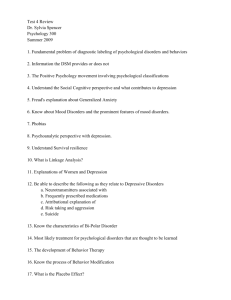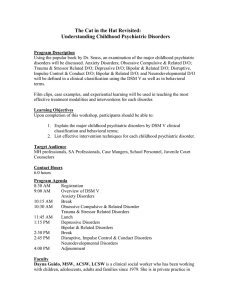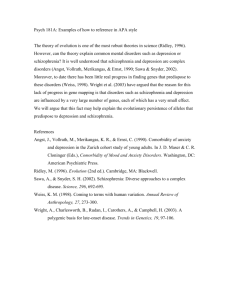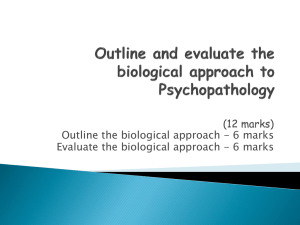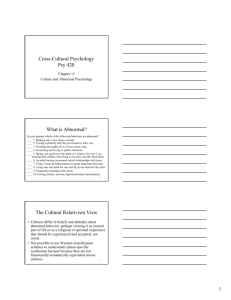Chapter 2 – Achieving Psychological Wellness
advertisement
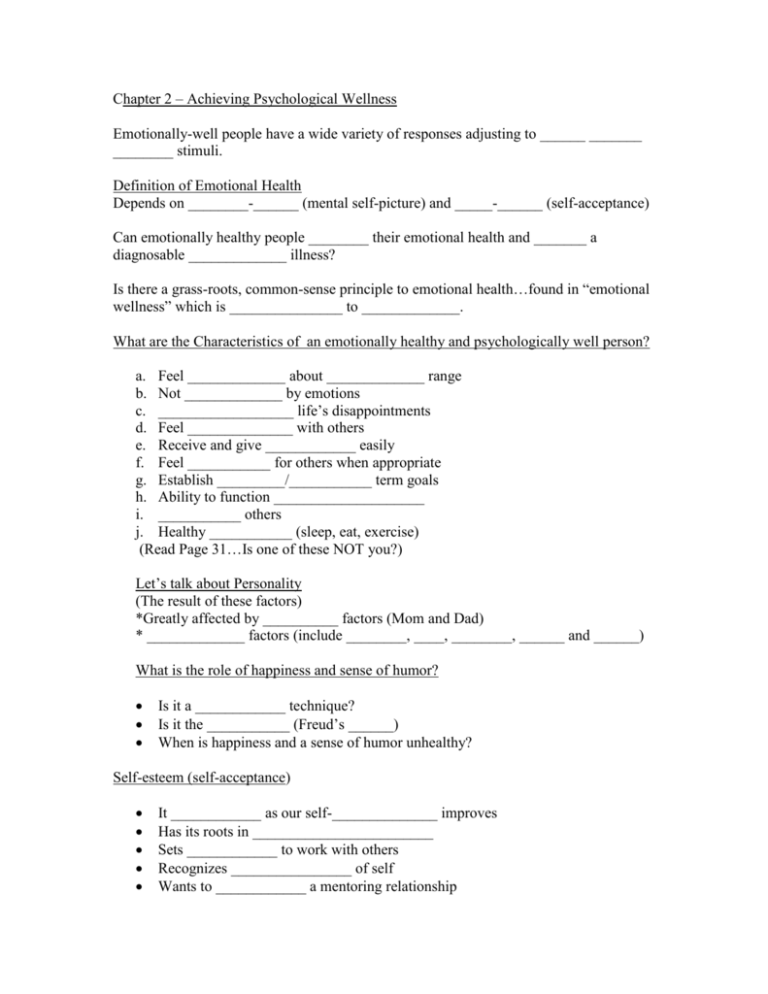
Chapter 2 – Achieving Psychological Wellness Emotionally-well people have a wide variety of responses adjusting to ______ _______ ________ stimuli. Definition of Emotional Health Depends on ________-______ (mental self-picture) and _____-______ (self-acceptance) Can emotionally healthy people ________ their emotional health and _______ a diagnosable _____________ illness? Is there a grass-roots, common-sense principle to emotional health…found in “emotional wellness” which is _______________ to _____________. What are the Characteristics of an emotionally healthy and psychologically well person? a. Feel _____________ about _____________ range b. Not _____________ by emotions c. __________________ life’s disappointments d. Feel ______________ with others e. Receive and give ____________ easily f. Feel ___________ for others when appropriate g. Establish _________/___________ term goals h. Ability to function ____________________ i. ___________ others j. Healthy ___________ (sleep, eat, exercise) (Read Page 31…Is one of these NOT you?) Let’s talk about Personality (The result of these factors) *Greatly affected by __________ factors (Mom and Dad) * _____________ factors (include ________, ____, ________, ______ and ______) What is the role of happiness and sense of humor? Is it a ____________ technique? Is it the ___________ (Freud’s ______) When is happiness and a sense of humor unhealthy? Self-esteem (self-acceptance) It ____________ as our self-______________ improves Has its roots in ________________________ Sets ____________ to work with others Recognizes ________________ of self Wants to ____________ a mentoring relationship What helps in acceptance? A. Verbal Communication i. Take time to ________ before you __________ ii. Focus words on ________________ thoughts iii. Speak __________ and _______________ iv. Talk with _________________ v. Start on _________________ note vi. Seek __________________ from listener vii. Use __________ forms of __________________ B. Non-verbal Communication i. _________l Expressions ii. ___ Contact iii. Touch with ____ iv. Appropriate _________________ (Seinfeld Close Talker) v. ___________ for success vi. Electronic ______________ (Who are you, anyways?) Maslow’s Hierarchy of Needs *It attempts to meet inner needs i. ____________ ii. ____________ iii. ___________ iv.____________ v. ____________ (Meet __________________ needs _______. Self-actualized has “__________”) Who has self-actualized? a. More _______experiences b. More response to ___________ c. Innovators d. Fuse work with __________ e. More likely to _____________ others (Do you buy this?) What is Creative Expresssion? a. __________ b. Less ________ c. ___________ d. _________ e. Governed by ________________ set of values (Do you buy this???) Spiritual Health *Those who have _________ have meaning to ___________/hopes *Sense of ____________ to believe in something “___________” than self Emotional “stability”??????? Taking Proaction to Health A Key to emotional health is the ability to control the __________ of experiences and thus to learn about your own emotional ________________. a. Construct ____________ pictures View yourself as you ___________ through your _______________ b. Accepting ____________ pictures __________ the truth of the picture __________ success __________ time __________ to be introspective c. Undertaking new ______________ Test your _____________ with new _______________ (simple to __________) d. ______________ Mental __________ With _____________ you can change your ____________ ____________ Psychological Disorders _______ million American diagnosed with _______ disorders annually ________ % of Adult population ________% of children Selected Forms of Psych. Disorders A. General Anxiety Disorders Intense ___________ and _________ Can’t control _________________ of worry Restless, appear ________ Treatment: Counseling and _______________ B. Depression Bi-polar and ___________ depression (severe __________ swings) Unipolar (Situational - ______________) General Character Depressed ___________ most of the day Loss of _____________ in activities Significant __________ changes Insomnia/__________ Psychomotor ________________ Feelings of ________ Decreased ability to act _____________ How handled? ____________________ ______________________ ________________ Other disorders: A. Seasonal Affective Disorder (______) Brought on by a lack of _____________ Weight ________; sluggish; ____________ sleep; social ______________; Mood __________ Treatment: _______________________ B. Suicide: Ineffective ___________ mechanisms Self-destructive _______________ Depression – sense of ____________ (suicide signs – more than ____ weeks for intervention to occur) C. Obsessive compulsive Disorder (OCD) (usually ____________) 1. Obsessive – Recurreant Thoughts of __________ to neutralize feeling Lack of interest in _________ world. 2. Compulsive – Repetitive behavior; _________ behavior; compulsion interferes with _____________ D. Panic Disorders Characterized by ________ attacks; Usually ___________ in nature Excessive ____________ activity Panic Attack Signs and Symptoms 1. Rapid _________ - like heart _________ 2. _________Pain 3. Sweating and __________ 4. ______________ 5. _____________ 6. Feeling of __________ __________ E. Schizophrenia Personality ______________ Traits: 1.Delusions 2. ________________ 3. ________________ 4. ________________ 5. ________________ 6. ________________ Therapists to Handle Situations: A. Psychiatrists ( ____ or ____) Specialists – Perform __________________ B. Psychologists (MS, Ph.D, Ed.D) Do the counseling in ___________ or ___________ C. Counselors (AA, BS, Certificates) Ministers, _____________, ___________________,________, Social ____________ Forms of Psychotherapy ********* Over _________ forms *********** Insurance influences type of Therapy (Why is this so?) A. Psychoanalysis (Deep, ___________ and ___________) B. Psychodynamic ( ___________ _____________) C. Behavioral Therapy (Brief, ____________ __________, Desensitizing, One on One) D. Cognitive (Understand why ________ arises; extinguish ___________ _________; Effective for Depression ______________ _________) E. ______________ (Used with other Therapies ________ and listening) F. Group (Cost ________; Try to rid social _________; good for ______ disorders) G. _____________ Practice (_____ Therapy, Marital ____, Family ______; ______) SUCCESS IS TIED TO ___________________________ FINAL THOUGHT: The Key is ___________ to ________ to _________with a greater self_______ and greater self ____________

